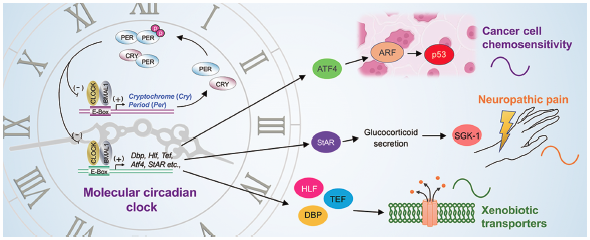1 0 0 0 OA Chrono-Pharmaceutical Approaches to Optimize Dosing Regimens Based on the Circadian Clock Machinery
- 著者
- Satoru Koyanagi
- 出版者
- The Pharmaceutical Society of Japan
- 雑誌
- Biological and Pharmaceutical Bulletin (ISSN:09186158)
- 巻号頁・発行日
- vol.44, no.11, pp.1577-1584, 2021-11-01 (Released:2021-11-01)
- 参考文献数
- 76
- 被引用文献数
- 3
Daily rhythmic variations in biological functions affect the efficacy and/or toxicity of drugs: a large number of drugs cannot be expected to exhibit the same potency at different administration times. The “circadian clock” is an endogenous timing system that broadly regulates metabolism, physiology and behavior. In mammals, this clock governs the oscillatory expression of the majority of genes with a period length of approximately 24 h. Genetic studies have revealed that molecular components of the circadian clock regulate the expression of genes responsible for the sensitivity to drugs and their disposition. The circadian control of pharmacodynamics and pharmacokinetics enables ‘chrono-pharmaceutical’ applications, namely drug administration at appropriate times of day to optimize the therapeutic index (efficacy vs. toxicity). On the other hand, a variety of pathological conditions also exhibit marked day-night changes in symptom intensity. Currently, novel therapeutic approaches are facilitated by the development of chemical compound targeted to key proteins that cause circadian exacerbation of disease events. This review presents an overview of the current understanding of the role of the circadian biological clock in regulating drug efficacy and disease conditions, and also describes the importance of identifying the difference in the circadian machinery between diurnal and nocturnal animals to select the most appropriate times of day to administer drugs in humans.
